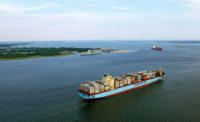As Congress gears up to produce a new water resources bill, a batch of proposed Army Corps of Engineers flood control, dredging, river locks and ecosystem restoration projects is getting in line to be included in the not-yet-drafted legislation. The list may greatly exceed the total in the last such measure.
Since the previous Water Resources Development Act (WRDA) was signed into law on Oct. 23, 2018, the Army’s chief of engineers, Lt. Gen. Todd Semonite, has signed reports recommending 17 projects, valued at $9 billion in all, he told the House water resources and environment subcommittee at a Jan. 9 hearing. [View Webcast of hearing here.]
R.D. James, assistant secretary of the Army for civil works, said in prepared joint testimony with Semonite for the hearing that those 17 were being reviewed "to determine the administration's position" on them. They would be prime candidates to be included in a 2020 WRDA.
Rep. Peter DeFazio (D-Ore.), who chairs the full Transportation and Infrastructure Committee, and other members of the panel want to move a WRDA this year.
That would continue the recent practice of approving a WRDA bill every other year. Such legislation was enacted in 2014, 2016 and 2018. The 2014 bill came seven years after the previous WRDA.
James and Semonite’s testimony listed the projects with completed "Chief’s reports." They include three in Texas, two in California and two in New York. The testimony didn't specify the funding sought for each project.
More projects are likely to follow. Semonite said he will sign Chief’s reports by the end of May for another 20 projects and an additional 15 are expected to be signed by the end of December.
If all of those projects are authorized in the new WRDA, they would total 52, far more than the 30 included in the 2018 measure, which was part of the America's Water Infrastructure Act. The authorizations still would require annual appropriations.
DeFazio told ENR in a Jan. 9 interview that he has several other components he'd like to see in the new WRDA. He said that if the Senate doesn’t pass a bill to make it easier to appropriate more money from the Harbor Maintenance Trust Fund—along the lines of legislation the House approved in October—he would seek to include it in the WRDA bill his panel will work on.
DeFazio said the trust fund measure would “give the Corps more resources to deal with its massive backlog of projects around the country."
In addition, he said the committee would “address issues regarding climate change and resilience” in the next WRDA.
Water resources subcommittee Chair Grace Napolitano (D-Calif.) asked James how climate change would affect Corps projects. “We’re still learning, I think,” James said. “Along with many other things that we have to engineer in our country, we do engineer our projects and try to protect people based on the science of what the climate is doing."
He noted that the Corps uses National Oceanic and Atmospheric Administration data.
James said, “Unless ordered not to do so, we will continue to follow the science and address and build projects for this country the way we’ve been doing it...."
In addition, DeFazio said that in the new water resources measure he wants “to look at more directly designating projects as opposed to this circular thing with Chief’s reports that we’re doing now.”
As for the timetable for the committee's introducing a WRDA, DeFazio said it would first roll out a surface-transportation bill. He said WRDA would come "a little later, probably this summer.”
DeFazio said he had already met with the committee’s top Republican, Sam Graves (Mo.), about WRDA legislation, and “talked it through, so I think it’ll be bipartisan. I don’t think it will be problematic.”
James said that the new WRDA “provides an opportunity to improve how the nation invests in water resources, including actions to enable stronger partnerships with non-federal interests.”
He said that would include “encouraging more non-federal leadership” on projects “and removing barriers that can impede the ability of non-federal parties to move forward on their own with investments in water resources infrastructure they deem priorities.”
In the Senate the Environment and Public Works Committee held two WRDA-related hearings last year, one in September and one in October. The panel at ENR press time had yet to unveil a WRDA proposal, but committee spokesperson Sarah Durdaller said via email,"The committee is planning to introduce and pass WRDA this year."
Story corrected on 1/13/20 to give correct name and enactment date of legislation containing the 2018 WRDA.



Post a comment to this article
Report Abusive Comment